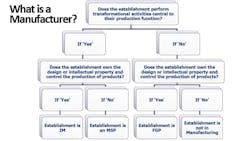Manufacturers Agenda: Will Some Offshore Production Be Counted as US-Based?
That's what will happen if we adopt the recommendations of the Economic Classification Policy Committee (ECPC). The group has proposed changes to how it classifies outsourcing in the North American Industry Classification System (NAICS). With the recommendations, some manufactured goods made in overseas factories owned by American companies will be classified as having been made in the U.S.
If that's not weird enough, manufactured goods that U.S.-based "factoryless goods producers" (FGPs) contract to have made offshore by a "manufacturing service provider" (MSP) and imported back to the U.S. will be classified as services -- not goods -- imports. In essence, the offshore company is providing the "service" of making the goods. If the MSP is located in the U.S., the MSP will be classified as a manufacturer, but the goods it produces will be classified as services.
Confused? That's just the beginning -- and it all almost sounds rational when you read the ECPC's recommendation.
I heartily endorse a review of the classification system. Dramatic changes over the past quarter century in how manufacturing businesses operate are not appropriately accounted for in the current approach. It is inaccurate to classify FGPs, which control goods production, as wholesalers, which do not control production. Indeed, IndustryWeek includes FGPs in the IndustryWeek US 500 and IndustryWeek 50 Best U.S. Manufacturers lists. We do so because we view manufacturing not just as production, but as a business whose strategy entails other important functions -- product design and engineering, finance, supply chain, etc. We celebrate the diversity of strategies U.S. manufacturers employ to become more competitive in a global market.InThe Controversial Proposal to Reclassify Outsourcers
Get Both Sides of the Debate from Around the Web
- Outsourcers Like Factoryless Goods Production Proposal
- OMB's Dangerous "Factory-less Goods Production" Rule
- What is Manufacturing and Where Does It Happen?
- Globalization Forces Major Change in Business Classification System: One Result Will Be That Imports From Manufacturers That Have Outsourced Production Offshore Will No Longer Be Considered Imports
Finally, in making these proposed changes, the ECPC seems to be ignoring the elephant in the room that it purports to address: outsourcing and offshoring. Their proposed changes would have the convenient (for some) effect of further burying the negative economic consequences of some offshore outsourcing practices. For good measure, it also would magically improve U.S. trade imbalances. I can understand why some smell the taint of politics.
There must be a better way. Let's find it.
About the Author
Patricia Panchak
Patricia Panchak, Former Editor-in-Chief
Focus: Competitiveness & Public Policy
Call: 216-931-9252
Follow on Twitter: @PPanchakIW
In her commentary and reporting for IndustryWeek, Editor-in-Chief Patricia Panchak covers world-class manufacturing industry strategies, best practices and public policy issues that affect manufacturers’ competitiveness. She delivers news and analysis—and reports the trends--in tax, trade and labor policy; federal, state and local government agencies and programs; and judicial, executive and legislative actions. As well, she shares case studies about how manufacturing executives can capitalize on the latest best practices to cut costs, boost productivity and increase profits.
As editor, she directs the strategic development of all IW editorial products, including the magazine, IndustryWeek.com, research and information products, and executive conferences.
An award-winning editor, Panchak received the 2004 Jesse H. Neal Business Journalism Award for Signed Commentary and helped her staff earn the 2004 Neal Award for Subject-Related Series. She also has earned the American Business Media’s Midwest Award for Editorial Courage and Integrity.
Patricia holds bachelor’s degrees in Journalism and English from Bowling Green State University and a master’s degree in Journalism from Ohio University’s E.W. Scripps School of Journalism. She lives in Cleveland Hts., Ohio, with her family.


